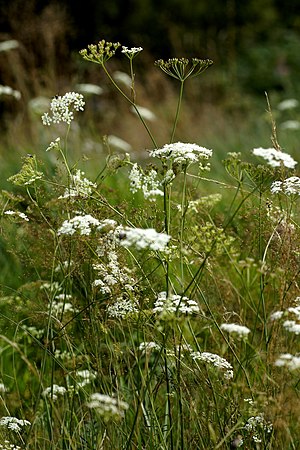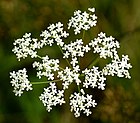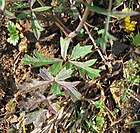Note: This is a project under development. The articles on this wiki are just being initiated and broadly incomplete. You can Help creating new pages.
Pimpinella saxifraga
Pimpinella saxifraga is a plant species in the family Apiaceae, a native of the British Isles and temperate Europe and Western Asia. It is neither a burnet, which its leaves resemble, nor a saxifrage although it has a similar herbal effect as a diuretic.
Contents
- 1 Uses
- 2 Parts Used
- 3 Chemical Composition
- 4 Common names
- 5 Properties
- 6 Habit
- 7 Identification
- 8 List of Ayurvedic medicine in which the herb is used
- 9 Where to get the saplings
- 10 Mode of Propagation
- 11 How to plant/cultivate
- 12 Commonly seen growing in areas
- 13 Photo Gallery
- 14 References
- 15 External Links
Uses
Tract infections, Urinary tract infections (UTIs), Bladder and kidney stones.
Parts Used
Chemical Composition
The main compounds are cariofilin, n-hexadecanoic acid and 9,12-octadecacic acid, hermakren-d and β-guryunene. [1]
Common names
| Language | Common name |
|---|---|
| Kannada | |
| Hindi | |
| Malayalam | |
| Tamil | |
| Telugu | |
| Marathi | NA |
| Gujarathi | NA |
| Punjabi | NA |
| Kashmiri | NA |
| Sanskrit | |
| English | Burnet Saxifrage, Greater Burnet Saxifrage, Hollowstem burnet saxifrage |
Properties
Reference: Dravya - Substance, Rasa - Taste, Guna - Qualities, Veerya - Potency, Vipaka - Post-digesion effect, Karma - Pharmacological activity, Prabhava - Therepeutics.
Dravya
Rasa
Guna
Veerya
Vipaka
Karma
Prabhava
Habit
Identification
Leaf
| Kind | Shape | Feature |
|---|---|---|
| Simple | Roundish–widely elliptic | 1.5-5.0 cm long |
Flower
| Type | Size | Color and composition | Stamen | More information |
|---|---|---|---|---|
| Bisexual | Corolla regular | White (occasionally reddish) | 5 mm (0.2 in.) |
Fruit
| Type | Size | Mass | Appearance | Seeds | More information |
|---|---|---|---|---|---|
| Simple Fruit | Egg-shaped–quite elliptic | 2–2.5 mm (0.1 in.) | Dark brown | {{{6}}} |
Other features
List of Ayurvedic medicine in which the herb is used
Where to get the saplings
Mode of Propagation
How to plant/cultivate
Easily grown in any good soil, preferring rather moist conditions. Grows best in a cool position. Plants are hardy to about -20°c. [3]
Commonly seen growing in areas
Photo Gallery
References
External Links
- Ayurvedic Herbs known to be helpful to treat Tract infections
- Ayurvedic Herbs known to be helpful to treat Urinary tract infections (UTIs)
- Ayurvedic Herbs known to be helpful to treat Bladder and kidney stones
- Herbs with Roots used in medicine
- Herbs with Leaves used in medicine
- Herbs with common name in English
- Habit - Herbs
- Index of Plants which can be propagated by Seeds
- Herbs that are commonly seen in the region of Tropical area
- Herbs
- Apiaceae



